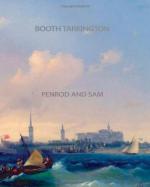It is not known in what light Mr. Kinosling viewed the expression of Penrod’s face. Perhaps he mistook it for awe; perhaps he received no impression at all of its extraordinary quality. He was a rather self-engrossed young man, just then engaged in a double occupation, for he not only talked, but supplied from his own consciousness a critical though favourable auditor as well, which of course kept him quite busy. Besides, it is oftener than is expected the case that extremely peculiar expressions upon the countenances of boys are entirely overlooked, and suggest nothing to the minds of people staring straight at them. Certainly Penrod’s expression—which, to the perception of his family, was perfectly horrible—caused not the faintest perturbation in the breast of Mr. Kinosling.
Mr. Kinosling waived the chicken, and continued to talk. “Yes, I think I may claim to understand boys,” he said, smiling thoughtfully. “One has been a boy one’s self. Ah, it is not all playtime! I hope our young scholar here does not overwork himself at his Latin, at his classics, as I did, so that at the age of eight years I was compelled to wear glasses. He must be careful not to strain the little eyes at his scholar’s tasks, not to let the little shoulders grow round over his scholar’s desk. Youth is golden; we should keep it golden, bright, glistening. Youth should frolic, should be sprightly; it should play its cricket, its tennis, its hand-ball. It should run and leap; it should laugh, should sing madrigals and glees, carol with the lark, ring out in chanties, folk-songs, ballads, roundelays——”
He talked on. At any instant Mr. Schofield held himself ready to cough vehemently and shout, “More chicken,” to drown out Penrod in case the fatal words again fell from those eloquent lips; and Mrs. Schofield and Margaret kept themselves prepared at all times to assist him. So passed a threatening meal, which Mrs. Schofield hurried, by every means with decency, to its conclusion. She felt that somehow they would all be safer out in the dark of the front porch, and led the way thither as soon as possible.
“No cigar, I thank you.” Mr. Kinosling, establishing himself in a wicker chair beside Margaret, waved away her father’s proffer. “I do not smoke. I have never tasted tobacco in any form.” Mrs. Schofield was confirmed in her opinion that this would be an ideal son-in-law. Mr. Schofield was not so sure.
“No,” said Mr. Kinosling. “No tobacco for me. No cigar, no pipe, no cigarette, no cheroot. For me, a book—a volume of poems, perhaps. Verses, rhymes, lines metrical and cadenced—those are my dissipation. Tennyson by preference: ‘Maud,’ or ’Idylls of the King’—poetry of the sound Victorian days; there is none later. Or Longfellow will rest me in a tired hour. Yes; for me, a book, a volume in the hand, held lightly between the fingers.”
Mr. Kinosling looked pleasantly at his fingers as he spoke, waving his hand in a curving gesture which brought it into the light of a window faintly illumined from the interior of the house. Then he passed those graceful fingers over his hair, and turned toward Penrod, who was perched upon the railing in a dark corner.




